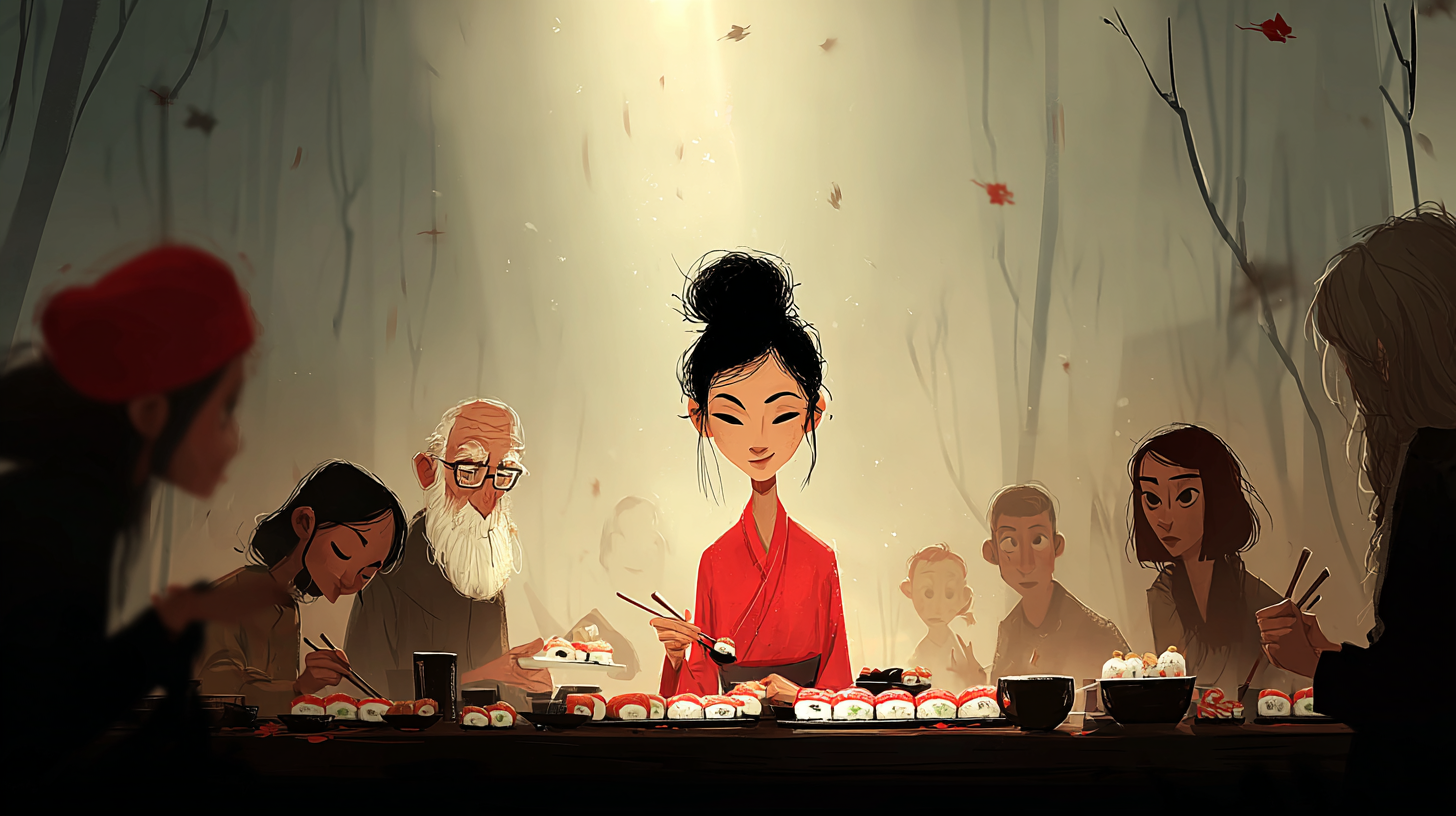以下は英単語 “culture” に関するストーリー型学習コンテンツです。まずは大枠の意味を理解して最後の文章で確認しましょう。
主な意味(main meaning)
| 品詞 | 発音記号 | 意味 | 例文 |
|---|---|---|---|
| noun | /ˈkʌl.tʃər/ | 人々が共有する考え方や生活のしかた(文化) | Japanese culture values harmony in society. |
| noun | /ˈkʌl.tʃər/ | 芸術や音楽などの活動(教養・文化活動) | She enjoys learning about art and culture. |
| noun | /ˈkʌl.tʃər/ | バクテリアや細胞を育てること(培養) | The scientist studied the bacteria in the culture. |
語源(etymology)
ラテン語 “cultura”(耕すこと、育てること)から来ている。
「育てる」イメージが核にあり、人の心や社会を育てる意味に広がった。
類義語(synonyms)
| 類義語 | 意味 | 例文 |
|---|---|---|
| civilization | 文明 | Ancient civilization left many great buildings. |
| tradition | 伝統 | The tea ceremony is an important Japanese tradition. |
| heritage | 文化的遺産 | We must protect our cultural heritage. |
| society | 社会 | Every society has its own rules. |
反義語(antonyms)
| 反義語 | 意味 | 例文 |
|---|---|---|
| barbarism | 野蛮 | Some people feared the city would fall into barbarism. |
| ignorance | 無知 | Ignorance of history can harm a nation’s culture. |
コロケーション(collocations)
| コロケーション | 例文 |
|---|---|
| cultural exchange | The students joined a cultural exchange program. |
| cultural diversity | The city is famous for its cultural diversity. |
| pop culture | Pop culture influences young people around the world. |
| cultural values | Respect is one of the most important cultural values in Japan. |
2項表現(binomials)
| 2項表現 | 例文 |
|---|---|
| culture and tradition | We should pass down our culture and tradition to the next generation. |
| art and culture | The museum promotes local art and culture. |
英語ストーリー(english story)
Short Story: A Workplace Cultural Exchange
Mika worked at a trading company in Tokyo. One day, her boss told her that the company would welcome a group of employees from Canada for a cultural exchange program. Mika felt excited but also nervous because she wanted to show the visitors the best parts of Japanese culture.
On the first day, the Canadian team arrived. Mika greeted them warmly. She explained that Japanese culture and tradition place great importance on respect and harmony. She wanted to give them not only information about business but also experiences with local life.
During lunch, Mika took them to a restaurant where they could try sushi. One of the Canadians said, “I love Japanese food! It’s so different from our pop culture back home.” Everyone laughed, and the atmosphere became relaxed. They began to share stories about their own cultural values.
In the afternoon, they visited a museum of art and culture. The Canadians were impressed by the ancient objects, which represented Japan’s long history. Mika told them, “Every civilization leaves behind something important. In Japan, we try to protect our heritage so that future generations can understand their past.”
The Canadian leader replied, “That’s wonderful. In our society, too, we believe it is important to protect history. Without it, people may fall into ignorance and forget who they are.” Mika agreed strongly.
Over the next few days, the visitors joined workshops about teamwork and communication. They learned that even though their traditions were different, they could still work together. Mika realized that cultural diversity was not a problem but a strength.
On the last day, they held a farewell party. Everyone thanked Mika for her kindness. One Canadian said, “You showed us that respect is at the heart of your culture. We will bring this lesson back to our country.”
Mika smiled. She knew that through this exchange, both groups had grown. Culture was not only about the past, but also about building understanding in the present. She promised herself to continue learning about other cultures as well.
和訳
ミカは東京の商社で働いていました。ある日、上司がカナダから社員が来て、cultural exchange(文化交流) プログラムを行うと伝えました。ミカはワクワクしましたが、日本の culture(文化) をしっかり伝えられるか少し不安もありました。
初日、カナダのチームが到着しました。ミカは温かく迎え、日本の culture and tradition(文化と伝統) が、尊敬や調和を大切にしていることを説明しました。彼女はビジネスの情報だけでなく、生活の体験も伝えたいと思っていました。
昼食には寿司店に連れて行きました。カナダ人の一人が「日本の食べ物が大好きです!私たちの国の pop culture(ポップカルチャー) とは全然違いますね」と言い、皆が笑いました。そしてそれぞれの cultural values(文化的価値観) について話し合い、雰囲気は和みました。
午後は美術館を訪れ、古い品々に触れました。カナダ人たちは日本の長い歴史に感動しました。ミカは言いました。「どの civilization(文明) も大切なものを残します。日本では自分たちの heritage(文化的遺産) を守り、次の世代が理解できるようにしています。」
カナダのリーダーは答えました。「素晴らしいですね。私たちの society(社会) でも、歴史を守ることは重要だと考えます。そうしないと、人々は ignorance(無知) に陥り、自分たちが誰なのかを忘れてしまいます。」ミカは強く同意しました。
その後の数日間、彼らはチームワークやコミュニケーションのワークショップに参加しました。伝統は違っても協力できると学びました。ミカは、cultural diversity(文化の多様性) は問題ではなく、強みだと気づきました。
最終日、送別会が開かれました。皆がミカに感謝し、あるカナダ人はこう言いました。「あなたは、敬意が日本の culture(文化) の中心にあることを教えてくれました。この学びを母国に持ち帰ります。」
ミカは微笑みました。この交流を通じて両国の人々が成長したことを知ったのです。Culture(文化) は過去だけでなく、現在の理解を築くものでもありました。ミカはこれからも他の文化を学び続けると心に誓いました。
Q&A
Q: “culture” と “civilization” の違いは?
A: culture(文化) は人々の生活のしかたや価値観を指し、civilization(文明) は科学・技術や都市の発展を含んだ大きな人類の進歩を意味します。たとえば、日本の文化は茶道や和食などを指し、文明は電車やインターネットのような技術の発展を表します。
Q: “culture” と “tradition” の違いは?
A: culture はその社会全体の考え方や生活様式を広く含みます。tradition(伝統) はその中で長く続いている習慣や行事を指します。たとえば、日本の文化の一部として「お正月」があり、その伝統として「おせち料理を食べる」ことがあります。
Q: “culture” と “heritage” の違いは?
A: culture は生きている人々の生活や価値観を表しますが、heritage(文化的遺産) は過去から残されたものを守り伝えることに焦点があります。京都のお寺は日本の heritage ですが、そこで行われる生活や考え方は culture です。
Q: “culture” と “society” の違いは?
A: society(社会) は人々が集まって作る集団そのものを指します。culture はその社会がどんな考えや習慣を持っているかを表します。つまり society が「人の集まり」なら、culture は「その人たちの考え方や生活スタイル」です。
Q: “culture” と “cultural exchange” の違いは?
A: culture はその国や人々の生活や考え方を指します。cultural exchange(文化交流) は、その文化を互いに紹介し合い、理解し合う活動を指します。文化は内容、交流はその内容をやりとりする行動です。
Q: “culture” と “cultural diversity” の違いは?
A: culture はひとつの文化を意味します。cultural diversity(文化の多様性) は、異なる文化が一緒に存在している状態を指します。たとえば東京には日本文化と外国文化が混ざっていて、それが cultural diversity です。
Q: “culture” と “pop culture” の違いは?
A: culture は広く社会全体の生活や価値を含みます。pop culture(ポップカルチャー) は音楽・映画・ファッションなど、大衆的で多くの人に人気がある文化を指します。伝統芸能は culture ですが、アニメやアイドルは pop culture です。
Q: “culture” と “cultural values” の違いは?
A: culture は全体の生活様式や考え方です。cultural values(文化的価値観) はその中で大切にされる具体的な考え方を指します。日本文化の中では「和を大事にする」という cultural value があります。



コメント